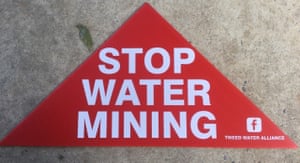Greed took over': the farmers fighting bottled water giants for their water
- Details
- Category: Water
- Created: Wednesday, 01 May 2019 10:22
- Written by Narelle Towie - Guardian UK
Water mining is big business in rural Australia but many growers fear for the future of their groundwater.
• Claims bottled water companies illegally extracting groundwater.
It’s the middle of the night and the roar of a massive truck echoes through the tiny village of Uki in northern New South Wales.The prime mover, hauling large stainless-steel containers laden with groundwater, is headed north, down narrow country roads, to bottling plants across the border in Queensland.In recent years, the number of water trucks moving through Uki has exploded as people buy up farmland across the shire of Tweed for its water allocation.
Bores, originally issued for irrigating crops or watering livestock, are being cheaply converted to commercial extraction permits, allowing land owners to extract millions of litres of groundwater a year for the booming $700m bottled water industry.
Pat Miller lives about 800km north of Sydney in the fertile northern rivers region of NSW and two years ago he joined theTweed Water Alliance, a group fighting to stop groundwater being trucked out of their community.
Angry Tweed residents have compiled a dossier of complaints about water tankers operating day and night through the rural tropical fruit and sugar cane growing region.
Miller fears that while bores are now monitored, there isn’t enough data to predict how water extraction will affect aquifers in the long term. “There was a glitch in the environment plan in the Tweed shire that allowed this to happen in Uki, it allowed water extraction for bottling purposes,” Miller says.
“Then greed took over and now they are popping up like daisies all over the place.”Across the nation, farming communities in NSW, Victoria, Queensland and Western Australia say water mining has become big business and they fear for their future.Much of the treated bore water is sold by big multinational companies such as Asahi and Coca-Cola Amatil for 2,000 times the cost of its tap equivalent.
Commercial water extractors maintain that their operations are a tiny proportion of groundwater use and that hydrogeological studies ensure the sustainability of aquifers.
But growers in rural communities are waging war against the industry and the loopholes letting it happen.
New South Wales
For those in the Tweed shire, Vince Connell, council director of regulation says the council has applied to the state government to change planning laws, to ban water extraction for commercial bottling in the area. If a ban is put in place, the four existing commercial bottling bores won’t be affected.
Western Australia
Back in the city, farmers in the Perth hills fear for the future of their orchards as dams and bores run dry. Roleystone orchardist Cathy Chmielewski says her farm used to rely on dam water, but after the dam dried up she turned to bores. These too have run dry.
“You can’t take that much groundwater out and not affect the surrounding properties,” Chmielewski says.
Coca-Cola Amatil spokesman Patrick Low would not reveal where the company runs bores but insisted that they do not draw water from unsustainable aquifers and that they independently confirm the sustainability of all spring and mineral water sources.“
We do not run bores dry,” Low said. “We monitor all of the sites we extract water from, through hydrogeological surveys and rigorous site management plans.”
“For our part, where we do extract water, we are scrupulous in ensuring that the source is sustainable both for our use and for that of all other users of the same aquifer.
”Perth’s rainfall has been declining since the 1970s and in 2015 Curtin University scientists found that parts of the city are sinking by up to 4mm a year from groundwater extraction.
Conservation Council WA director Piers Verstegen says while aquifers can be sustainable, constantly drawing from a bore can cause a cone of depression and significantly impact those close to it.
Queensland

Victoria
But the problem for Stanley was section eight of the state water act.
